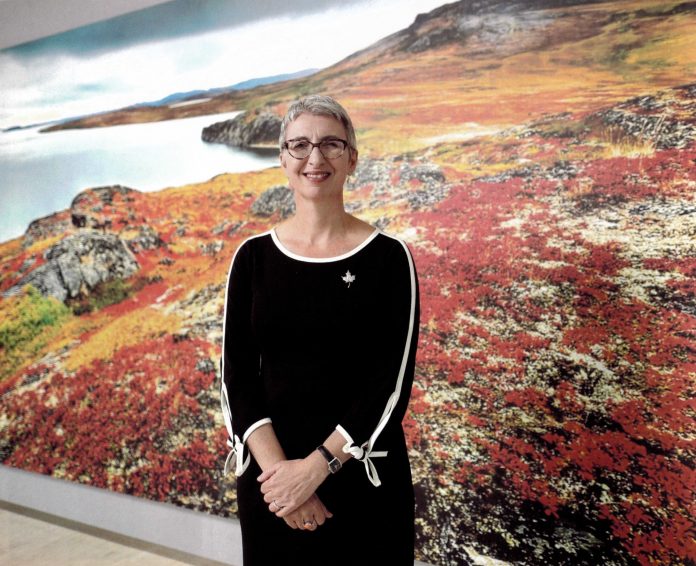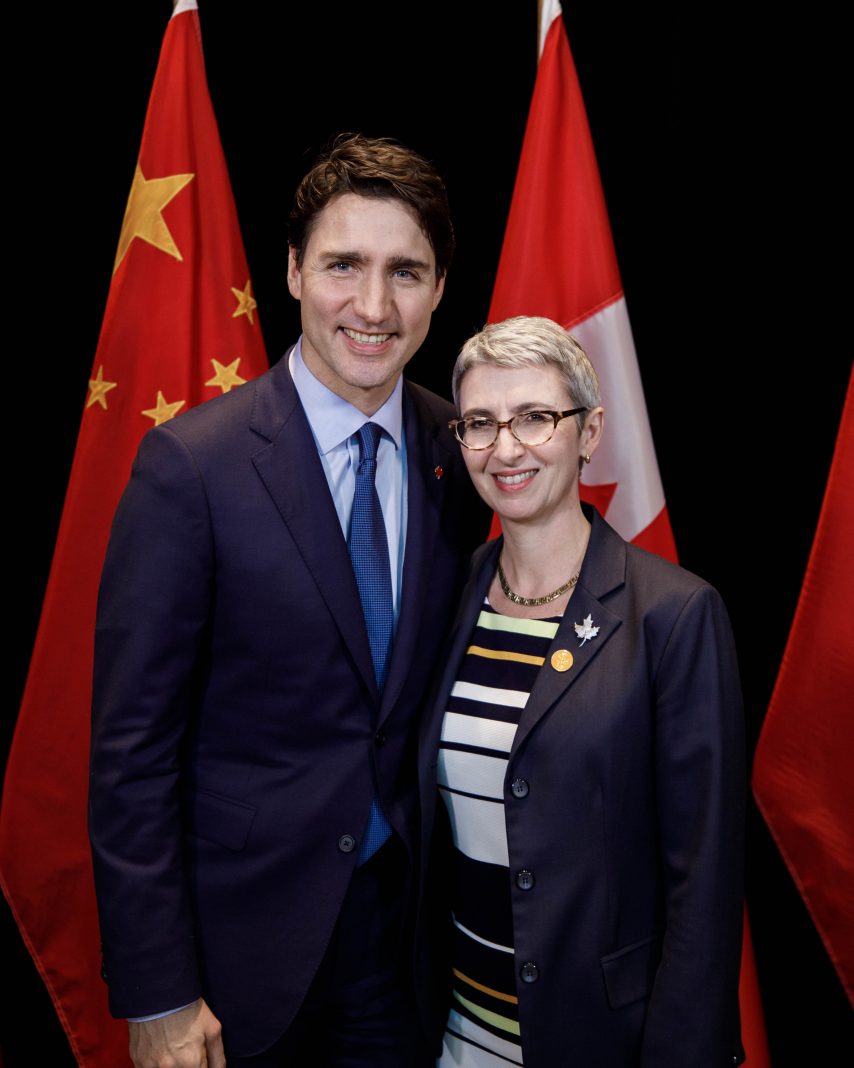
DB: You began your role as Consul General of Canada in September 2015. What do you feel have been the biggest changes in the relationship between South China and Canada in the last three years?
您2015年9月开始在加拿大驻广州领事馆担任总领事一职,您觉得在过去三年中,华南地区和加拿大之间的关系最大的变化是什么?

Le premier ministre remercie les membres du personnel du consulat canadien pour leur soutien durant sa visite à Guangzhou, en Chine. 7 décembre 2017.
I’ve witnessed a huge expansion in cooperation and ties between South China and Canada, with more business people traveling back and forth, more students, more travelers, and more formal twinning relationships between provinces and cities. In November, Nova Scotia has just signed their twinning agreement with Guangdong. Direct flights have been added between Guangzhou and Vancouver and Toronto, as well as flights from Xiamen and Shenzhen to Canada. Our government leaders are really focusing on this relationship too, to help people in both countries make connections to benefit our respective economies and societies. In December last year Prime Minister Trudeau visited Guangzhou, and several cabinet ministers have visited, including those responsible for the Environment and Climate Change and Agriculture. Since 2015 Premiers from six Canadian provinces have visited South China, some of them several times and with large business delegations. Alberta has established a new twinning relationship with Guangdong, and now like the province of British Columbia, has opened a representative office here to promote trade and investment. Canada’s Atlantic provinces have also been extremely active, in industries they are well known for such as high-end seafood and education, and also in high tech. These rapidly increasing contacts between leaders, business people, students, and citizens traveling back and forth are the engines to driving a stronger trade and investment relationship, and building better knowledge and appreciation of each countries’ strengths.
此间,我见证了华南地区和加拿大之间的合作和联系获得巨大的进展,越来越多的商务人士、留学生和观光游客频繁往返两地,中加两国的省份和城市之间也签订了多个友好关系协议。就在刚刚过去的11月,新斯科舍省和广东省签署了友好省协议,全面推进两省的各项合作。广州到温哥华和多伦多都开通了直航,除此之外,厦门和深圳到加拿大现在也已经有直飞航线。加中两国政府非常看重两国关系,我们希望能通过密切两国的联系促进双方的经济和社会发展。去年12月份,加拿大总理特鲁多访问广州,几位内阁成员也陪同出访,其中包括了环境、气候变化和农业领域的官员。自2015年以来,已经有来自加拿大6个省份的省长陆续到访华南地区,其中几位已经来访过不止一次,并带领者大型的商务代表团一同前来。阿尔伯塔省已经与广东确立友好关系,而且与不列颠哥伦比亚省一样,在广州建立了代表办公室,以期促进贸易和投资。加拿大的大西洋省份一直以来也非常活跃,他们比较为人熟知的行业领域包括高端海产业和教育行业,高科技领域也有不错的成绩。两国之间联系得越来越密切的政府高层、商人、留学生,以及穿梭于两国之间的民众,都是促进两国贸易投资关系,加强互相了解与欣赏的强大动力。
DB: You joined External Affairs and International Trade Canada in 1992. How has your previous experience prepared you for your current role?
您于1992年开始在加拿大全球事务部工作。您的这段经历对您现在的工作有什么帮助?
I’ve been very lucky to have a foreign service career focused on Asia. I believe this region of the world, and especially China, is an incredibly important partner for Canada, now and in the future. My two previous assignments in China, at our embassy in Beijing from 1995-2000 and 2006-2011, really opened my eyes to the deep complementarity between our people and our economies. We have much to offer each other. So now, serving as Canada’s Consul General for six Chinese provinces – Guangdong, Fujian, Jiangxi, Hunan, Guangxi and Hainan – I get to work with a great team of colleagues to promote commercial, cultural, sports, educational, tourism and other links, based on this complementarity, to create jobs, economic opportunities, and better understanding between people in both countries.
我一直觉得自己非常幸运能从事加拿大在亚洲地区的外交工作。我相信亚洲,尤其是中国,无论是现在还是在将来,都是加拿大极为重要的合作伙伴。我曾于1995-2000年以及2006-2011年在北京的大使馆任职了两个任期,这段经历让我对两国人民之间和双边经济方面的强烈互补性有了全新的理解。我们在很多方面可以互利共赢。所以,现在,作为加拿大驻广州总领事,我的工作范围主要辐射华南六个省份——广东、福建、江西、湖南、广西和海南。基于优势互补的特点,我与我非常得力的团队一起促进加拿大与这些地区在商业、文化、体育、教育、旅游业等方面的联系,希望创造更多工作机会和经济发展可能性,也增进两国人民之间的相互了解。
DB: What initially attracted you to come to China and aside from your job, what inspires you to stay?
除了工作,一开始是什么吸引了你来中国,又是什么让你选择留下来?
As a university student, I was studying Mandarin as part of my degree in East Asia Studies. I was offered a scholarship to study language for one year at Nanjing Normal University, through an Ontario-Jiangsu province twinning relationship. What a great opportunity for a young penniless student! That was what brought me, and my interest in China has kept me coming back. During my time in Nanjing, I also met the person who would ultimately become my husband, so that has also kept my interest in China very current and very strong!
我本科学的是东亚研究,中文是我的必修课之一。通过安大略省和江苏省的友好省关系,我曾获得奖学金在南京师范大学进行为期一年的语言学习。对于一个没什么钱的学生来说这个机会真的太棒了!这就是为什么我会来到中国,爱上中国,并且不断再回到这里的原因。而且,我在南京的时候,也遇到了我生命中的另一半,这也是为什么我一直保持对中国浓厚的兴趣原因之一吧。
DB: On your website, you emphasize that your work here in China is all about “people and partnerships.” What does this mean to you and what procedures have you implemented to ensure this remains your primary focus?
你们的网站上强调你们在中国工作重点是“人与合作”。这对你们来说意味着什么,你们又有什么相关行动来保证自己不忘初心?
We often speak about relationships between countries, but in reality, the core of these relationships is based on contact between individuals. Our work here in large part centres on acting as the connector, bringing together Canadians and Chinese with similar interests and objectives to work together collaboratively, across many fields of endeavour. And of course, we have many partners in this effort; in 2018, it has been very exciting to witness the creation of a new organization, the Pearl River Delta Canadian Chamber of Commerce, known as CanCham PRD. We look forward to working closely with them as they bring together Canadians and people with close ties to Canada in the PRD region to help them be successful as business and organizations operating here. And there are many other examples; we partner closely with Canada’s provinces to promote greater awareness of them in China as travel destinations and sites for business partnerships and investment. British Columbia and Alberta provinces have offices right here in Guangzhou to allow them to reach out to local residents.
我们经常谈到国家之间的关系,但事实上,这些关系的核心都是建立在人与人之间的联系上的。而我们的工作很大程度上是作为连接器,努力让中加两国不同领域有相似兴趣和目标的人们能够共同合作。当然,我们有很多一起共同努力的合作伙伴。2018年,我们非常欣喜看到加拿大珠三角商会(CanCham PRD的成立。我们期待能跟他们有更密切的合作,因为他们旨在推动珠三角地区的加拿大人以及和加拿大有密切关系的相关人员建立联系,帮助他们成功运营当地的生意和机构。除此之外,我们还有很多其他案例。比如,我们与加拿大各省合作,通过推广旅行目的地和商业合作投资的角度,使他们更多地在中国范围内被认识和了解。其中,不列颠哥伦比亚省和阿尔伯塔省都在广州有办公室,他们能够直接了解当地情况。
DB: Both China and Canada have rich yet in many ways, vastly different cultures. What advice would you give to Canadian expats hoping to discover and embrace the multiplicity of culture that Guangzhou has to offer?
中加两国都拥有十分深厚的文化底蕴,然而两者不尽相同。对于希望探索和了解广州文化多元性的在华加拿大人,您有什么建议?
I would have two pieces of advice; first, let your appetite be your guide! Guangzhou has some great places to eat, and a lot of culinary variety. So, don’t be shy about heading out to try to new dishes, and if you can go with local friends, even better as they will surely have favourite spots to recommend. My second piece of advice is, ask those same friends for recommendations about sites and day trips in and around Guangzhou. It’s very easy with a busy city life here to miss out on amazing places in Guangzhou itself and nearby, and a lot of them are not so well covered in foreign travel guidebooks. Some of my favourites are Shunfengshan Park in Shunde with its amazing gate or paifang, or just walking around Xiaozhoucun here in Guangzhou.
我有两个建议:第一,跟着你的味蕾走。广州有很多不同的食物,是名副其实的吃货天堂。所以一定要多尝尝不同的菜式。如果你有本地朋友一起,可以让他们给你推荐一些他们最为喜欢的餐馆。我的第二个建议就是,问问本地朋友的建议,比如市区和周边的景点和一日游的安排。繁忙的城市生活很容易让人错过广州及其周边的一些很棒的景点,而且很多地方都是你在国外旅行指南中找不到的。我最喜欢的两个景点,一个是顺德的顺峰山公园,那里有一个非常壮观的牌坊;另一个就是广州的小洲村,很适合散步。





